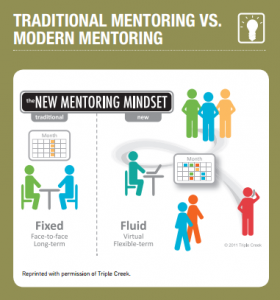 Earlier this week, I had the pleasure of attending a Women’s Health Leadership TRUST panel where the topic was modern mentoring. The speakers discussed how mentor relationships today do not only benefit the mentee, but the mentor as well. Teaching and learning are now two way streets in modern mentoring, as age groups like millennials bring advanced digital knowledge to the table.
Earlier this week, I had the pleasure of attending a Women’s Health Leadership TRUST panel where the topic was modern mentoring. The speakers discussed how mentor relationships today do not only benefit the mentee, but the mentor as well. Teaching and learning are now two way streets in modern mentoring, as age groups like millennials bring advanced digital knowledge to the table.
Mentor and mentee relationships are a crucial part of everyone’s professional development. The panel discussed the key pillars of modern mentoring:
- Open and Egalitarian: Modern mentoring should occur in an open environment, allowing everyone to learn and teach.
- Diverse: Diversity is essential to modern mentoring. Not only does this include race, gender and age, but you also want to have cross-functional, cross-geographical and cross-generational relationships. Different perspectives within the relationship can help create new ideas and bring issues to light.
- Safe and Judgment-Free: Mentoring relationships should be a safe place to ask questions and share experiences. Keeping your mentor relationships separate from performance-related systems and processes is crucial in creating these safe and judgment free zones.
- Independent and Autonomous: Organizations that are implementing modern mentoring need to realize that all relationships are different – and that’s ok. You don’t need to define who will participate in what roles, as it is likely the learning and teaching will be a two way street.
- Asynchronous: Communication and collaboration has become asynchronous due to the global and complex nature of today’s organizations. Technology plays a big role here by allowing people to communicate on an as needed basis, even if it is halfway around the world.
- Self-Directed and Personal: People want to drive their own learning, and allowing them to do so helps to address real-time learning needs.
- Technology-Centric: Technology enables organizations to share the knowledge, skills, and abilities of the entire workforce online, making everyone accessible. Mentors and mentees can also connect through several different mediums, which makes it easier to connect through busy schedules.
- Flexible: Modern mentoring relationships will always be changing as learning and knowledge strengths continue to evolve. Adaptability helps generate real work results from mentor relationships.
I learned a lot about mentoring relationships from the mentor perspective. As someone who is in the early stages of their professional career, it was interesting to hear the different perspectives of several successful professionals in the health industry and their experiences with mentoring relationships. This insight got me thinking about how mentees can make the most out of their mentoring relationships:
Know what you want out of the mentoring relationship
Whether you’re asking someone to be your mentor, or meeting with your mentor for the first time, have a clear idea of what you want the relationship to be. This ensures that you and you mentor are on the same page, and allows the relationship to be as beneficial as possible. Not to mention most mentors have incredibly busy schedules, so this helps you get the most out of the time you do get with them.
Have a plan, but be open to surprises
When your mentor – or anyone – asks you where you see yourself in five years, you should definitely have a clear answer. However, that doesn’t mean that you always need to stick to that five year plan. Unexpected opportunities are going to come your way, and the least you can do for yourself is consider them. These unexpected opportunities are great topics to talk through with your mentor, and discuss how this new opportunity could add to your “personal toolbox” of skills.
Know the difference between a mentor and a therapist
The great part about having a mentor is you have someone to ask questions to in a judgment-free zone. However, make sure you are saving relevant questions for your mentor. There is a fine line between someone who is there to help you figure out what’s best for you and your career and someone who listens to all of your problems.
